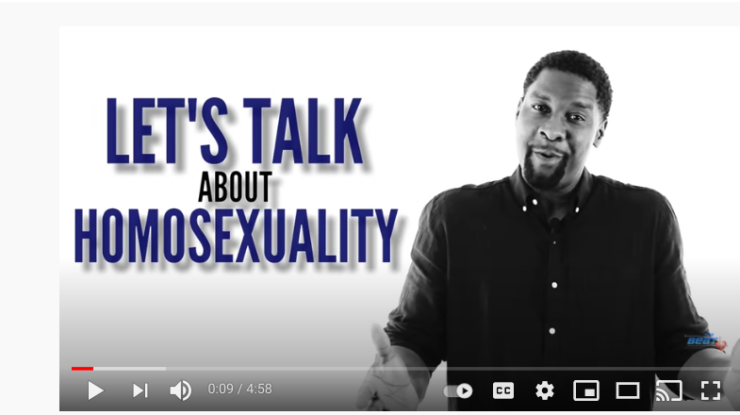Introduction
On March 26, 2021 Lil Nas X released the most controversial song of his career, “Call Me By Your Name.” Many songs in pop culture today that go unnoticed about all sorts of disputed topics such as; drugs, sex, and body exploitation. This song, however, got attention from the media and Christian groups around the world. Whether is was because he was giving Satan a lap dance, or because he was singing about being gay, it received a lot of negative backlash. Nas sings about his love for the same sex, and that if being who he is means he will go to hell than he gladly will do it. This mindset caused waves around the internet, and almost caused his song to be taken down to prevent further streaming. A later apology from the singer caused him to explain in greater depth why he created the song and music video the way he did. He told the story of his childhood and being bullied by Christian kids his age because he was not straight. He was told for years that he was a sinner and was going to hell, all because of his sexual preference. Nas said that once he was able to grow his platform, that he wanted to be vulnerable with his audience and provide support for those facing the same struggles he had.
This is not the first time sexuality and religion have clashed. There is a vast gray area surrounding the topic, especially within Christianity. Some individuals who are supposed leaders of the teaching of Christ have formulated their own opinions regarding the topic of sexuality, some of which have no evidence other than their own bias to support their incorporation of it into their religion, others do have evidence but it is flawed in many areas. Allan Parr is the leader of The Beat Christian group that has a goal of spreading their religious beliefs to all Christian groups globally. He uses his platform to spread his ideas, and to answer questions that Christians may be too afraid to ask. Alan Parr uses his religious beliefs to justify his homophobia by conveying to his audience that it goes against God’s will and that homosexual tendencies are easily controllable.
“Who are we to come along later and redefine what God has already ordained?” (1:31-1:40)

Parr explains that society has no right to go against God’s will, however, he bases this off of flawed scriptures within the bible. Questions have arisen about whether the bible is reliable after its many retranslations, the arguably most popular retranslation occurring in 1946, posing an entire documentary to be written in response to the scripture becoming unaccepting of the gay community. A report done by Forbes Online found that “The word ‘arsenokoitai’ shows up in two versions of the bible, but was not translated to mean ‘homosexual’ until 1946.” This seemingly minor translation shaped a whole era of Christian studies and research because up until that point, the area of homosexuality was a sort of gray area within the Christian religion and had now been entered into the scriptures in a questionable way.
This scandal grabbed the attention of filmmakers, as well. The story was fed to the public through the film “1946,” that explains the attempts of not only how and who made these mistakes, but the attempts to fix it. The correction, however, was not made until 25 years later, after further definitions and studies of the original text, pinpointed a separate denotation making the term have a closer relationship with sexual perverts than homosexual. By this time millions of copies within the 25-year gap had been printed holding the idea that homosexuality was indeed a sin and had simply just now been translated for English speakers to better understand. There is not an original copy of the bible, and many of the rewritten or re translated versions have been altered to a great extent, not just regarding homosexual or sins in general. Scholar Bart D. Ehrman, who specializes in analyzing the New Testimate, discusses major alterations made regarding who put Jesus to death. It was found to be changed to limit prejudice towards the originally condemned group. No one questioned this change in the bible, even though it was not what God had originally stated, even though that story is arguably the most well-known in the bible.
“Just because you have homosexual desires doesn’t mean you have to act on them.” (2:15-2:19)

Homosexual behavior is mainly recognized in humans because they are most outspoken and biggest representations of these tendencies. That being said, many people fail to realize that many other species happen to exhibit similar behaviors. Scientific American found homosexual behavior has been “observed in 1500 animal species, from primates to sea stars, bats to damselflies, snakes to nematode worms.” Further examination into this found specific examples and areas of their brains to study patterns and draw connections between homosexual behavior and brain development within the early stages of an organism’s development. Hormonal shifts during pregnancy have also been deemed responsible for homosexual tendencies. Studies reported by The Conversation, found that “In rats, manipulation of hormones during pregnancy produced offspring that exhibit homosexual behavior.” That supports the idea that it in fact is not a choice made by the gay or lesbian individual, but rather from the mother of the organism as a genetic abnormality.
Genetics themselves are not controlled by an individual and cannot be turned on and off at will, making the statement that individuals that have homosexual tendencies have the ability to control them is false. Further investigation into brain function relating to homosexual tendencies has told us that they were able to find a specific size differences within the nucleus of a heterosexual individuals brain and those who identify as homosexual. PNAS (Proceedings of the National Academy of Sciences of the United States of America), writer Dick F. Swaab, found that the brains “clock” or suprachiasmatic nucleus (SCN), is significantly larger in homosexual men, than that of heterosexual men, and they even found similarities between the sizes of SCN between heterosexual women and gay men. Further studies to prove this related to being related to sexual preference found that the changing in sizing was indeed caused by hormonal imbalances and changes during pregnancy of the mother. This trend was also found between rats with homosexual tendencies versus heterosexual tendencies.
“God loves you in spite of what you do.” (2:40-2:45)

The idea of Christianity revolves around the idea that Jesus died for the sins of all people. This is confirmed to be Parr’s belief as well as his site The Beat, discusses their core beliefs as a Christian group and advocates of the Christian faith. They list Romans 3:25-31; 2 Corinthians 5:14; Hebrews 10:5-14 under their statement of faith, agreeing with this claim. That fact leads to the idea that if sins committed by Christians are all forgiven, even if those sins are uncontrollable. Furthermore, that Christians should not judge the sins of others who have committed these sins. The Christian faith has been given a pretty bad wrap in society, and many of the opinions formulated around them oppose what Christianity has begun to stand for, turning and pointing fingers and competing for who is leading a better, sinless, life.
This trend in the Christian faith has not gone unnoticed, even in Christian journalists like John Burton. In one of his writings adapted by The Christian Index he states “My question at this hour is not whether God should bring judgment to the homosexual or not. The question is whether he should enact judgement on a passive, impotent American church.” His fear described was that churches have become too passive around the discussion of sins in attempts to avoid conflicts, which has just ended up creating more, and has ended up normalizing them. Even in the process of sins becoming a daily part of people’s lives, The Christian Index recognizes that “The way out is through Jesus Christ, who never condoned sin, but died for the most heinous of our transgressions so that we might be forgiven and have eternal life.” This is a representation of the Christian faith being accepted for their wrongdoing, much like Parr’s messages of faith on his website. This draws the question that if God loves and forgives all wrongdoing, then why make a video shaming homosexuals for their uncontrollable tendencies? It contradicts his statement to say that “God loves you in spite of what you do,” but then tell a gay person they are making the choice to disobey God.
“Just because the culture around you is becoming more and more tolerant and accepting of these issues, doesn’t mean that we as Christians should conform.” (3:34-3:44)

It’s natural through the course of time for society to become more accepting and nurturing to the idea of reform and change. If Parr’s mindset resonated with real history, events such as the Civil Rights movements would not have been so impactful. The Civil Rights movement was a huge cultural reset within the US for many different groups; African Americans, Native Americans, women, and yes, gay people. This era brought forth a large religious revival, especially Christianity, because of the fear of atheistic communists living within the country. The documented baptism of President Eisenhower while he was in office by History, further proved the dedication of him, and the federal government to God because at the time Christians were the only trusted group to govern America. Discrimination continued with decisions made by the president in his passing of Executive Order 10450, that restricted certain career opportunities for gay people because they were seen as security risks. Christians within the government used their power to withhold the rights of loyal Americans based on their sexuality with no real evidence of them being a risk to employers. Relating to Parr’s claim, the best way to handle differences regarding sexuality is to invalidate them and not allow them a role within society.
As time went on, the US became more accepting of the Gay Community, allowing more and more people to feel comfortable in their own skin regarding their sexuality, but society is far from welcoming all indifferences between on another. The constant hatred faced can take tolls on the individuals it is inflicted on. Statistics from Reuters, a health organization, found that children that identify as part of the sexual minority were three times more likely to kill themselves than heterosexual children. The only solution to prevent this stigma is a supporting community and relations with those close to you, and even that may not be enough. Brian Mustanski, an American psychologist, confirmed this and told Reuters that “Having positive family relationships and parental support promotes positive mental health, but it doesn’t take away the effects of bullying[…].” With this information in mind, Parr providing a negative connotation towards the idea of being accepting towards homosexuals, will only make him and his platform a further part of the problem. Christians not associating themselves with welcoming indifferences in society will only normalize this social inequality.
“You’re not going to hell for being a homosexual.” (2:02-2:12)

It is important when finding supporters for anything from elections, clubs at school, and even religions, to have a sense of belonging, and Christianity is no exception. People not feeling validated, especially within the large Christian spectrum, it causes them to turn away from Christianity altogether. A 2014 survey by Religious Landscape regarding the LGBTQ community and their religious beliefs, found that of the 59% surveyed that did affiliate themselves with a religion, less than half of them recognized themselves as Christians. The hatred that gays and lesbians face makes it difficult for them to want to want to associate themselves with religions, or groups in general, that hold prejudice against them.
Of those that do support Christianity as their faith still face discrimination from within the churching system itself. The General Conference is held each year to discuss changes to be made to church policy and structure. Many LGBTQ members and allies fight each year to change policies regarding the community to reverse discrimination that has been placed on them to encourage a more accepting environment. A Human Rights Campaign followed the story of the “Traditionalist Plan” in 2019. The plan placed harsher restrictions on supporters of the LGBTQ community within the churches, as well as members of the community attending churches. Thus, making it more and more difficult for gay people to lead a Christian life, because they are being further limited to their available places to practice Christianity. These factors lead to the rejection of the “savior” because they are told that they do not matter and are not cared for within this faith.
Conclusion
The topic of homosexuality is often ignored within the Christian faith. Whether it is because people are unaware of the contradictions placed in the bible, the lack of support formulated from an ever changing society, or because of bias placed within individuals; homophobia is embedded within the Christian faith. Without information being spread to those blatantly unaware, like Parr, to end the idea of homophobia within this faith and within its bible, and to inform themselves how uncontrollable homosexuality truly is, homophobia will continue its presence within this religion. If that continues there will be more people that suffer from the same discrimination and hatred, like Nas X, only their stories will not have as happy of an ending.
Video: https://www.youtube.com/watch?v=lg1-QCCItPA
All images were taken from the selected video.

